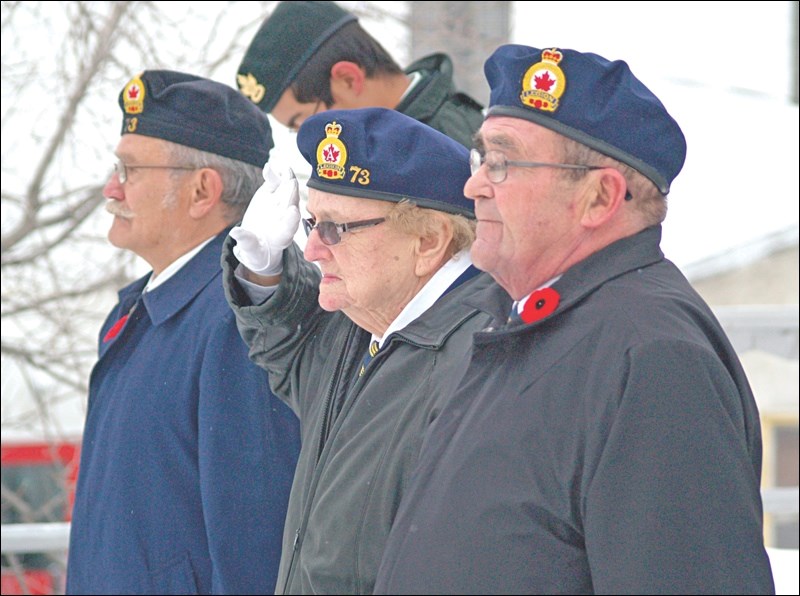Women’s wartime experiences form a central part of Canadian history.
That was the message as some 20 attendees gathered at the Flin Flon branch of the Royal Canadian Legion to hear about the experiences of two Flin Flon women during the Second World War.
International Women’s Week committee member Katie Kawerski led the presentation, which focused on Margaret Beever, a Second World War veteran, and the late Elly Trudeau, a Dutch war bride who moved to Manitoba in 1946.
Kawerski stressed the importance of honouring the women who helped shape Canada and maintain the war effort on the home front.
She noted how women had to “step up and take things men took care of” during the Second World War, working as shipbuilders, loggers or taxi drivers, often while maintaining a home and raising children while their husbands were overseas.
“Before the war broke out, there were 600,000 Canadian women who held permanent jobs,” Kawerski said.
“During the war, those numbers doubled: 1.2 million women worked outside of the home.”
With Beever at her side, Kawerski told the veteran’s story.
“This independent 18-year-old wanted to enlist in the army, but her family wasn’t too thrilled with it,” Kawerski said.
“But when she enlisted, and went back home for a visit, her dad was the proudest dad ever.”
Beever completed her basic training and was deployed to Vancouver where she worked in military stores, packing military items and equipment.
“She said it was important work, considering she was freeing up servicemen for overseas missions,” Kawerski said.
Beever had hoped to serve overseas, but by the time she signed up, the war had ended.
After the war, Beever met her husband, Hank Beever, and they relocated to Flin Flon.
Life as a war bride
Richard Trudeau, Elly Trudeau’s son, recalled stories about his mother’s experiences relocating from Holland to Canada after the Second World War.
“Mom and Dad didn’t speak very often about the bad things that happened,” he said, though he remembered his mom telling him about seeing Hitler in a parade during the German occupation.
“She said it was an image that she could never forget.”
His parents met in 1945, just after the liberation of Holland, when Wilfrid Trudeau was stationed in the small community of Hattem.
While patrolling a canal by boat one summer evening, he took note of a Dutch family waving as he drove by.
“His eye was caught by this redhead, Mom,” said Richard.
“He pulled into the shore and wanted to give her a boat ride. After convincing her dad with chocolates and cigarettes, he was able to give that redhead a ride.”
A whirlwind courtship began, and the two were soon married—three times: they had a military wedding, a union in the Dutch community where Elly had grown up, and a Roman Catholic wedding when they were reunited in Canada.
After saying her goodbyes to her five siblings and parents, Elly set off alone for her new life as a war bride. She boarded a ship in Liverpool and landed at Halifax’s Pier 21, where 43,454 war brides and their 20,997 children were received during the Second World War and the years immediately following.
After going through customs, each war bride was given a booklet on life in Canada, prepared by the Governor General’s wife, which Richard described with a smile.
“One of the questions says, ‘What do you do when people ask you, “What do you think about Canada?” and the answer is, “You’re supposed to say ‘I love it.’ If you do that, you’ll make friends very quickly.””
Upon their arrival, the war brides boarded passenger rail cars, heading west to their new homes across the country.
“I remember Mom telling me that there were some women who would not leave the rail car. Some of these women had grown up in bigger centres, and the train would stop in the middle of nowhere and they’d tell the war bride, ‘This is your stop.’
After her journey across Canada, Elly was received by her husband’s sister, and Wilfrid joined her shortly thereafter.
The two heard about the jobs in Flin Flon and moved into town, eventually settling in Channing.
Richard recalls that settling in was a bit of a challenge at first, as both his mother and his French Canadian father spoke little English.
“She adapted, and learned to drive, and she fell in love with Flin Flon so much she convinced her mom and dad and two brothers and sister to immigrate to Canada,” Richard said.
Elly was a stay-at-home mom before taking a job at Central Meat and Grocery, then later at the Flin Flon General Hospital. She shook hands with some significant figures in her lifetime: Pierre Trudeau, Prince Charles and John Diefenbaker.
“She always referred to herself as a Flin Flonner,” said Richard, who noted that his mother was active in the community as a regular curler and a participant in the North Star Rebekah Lodge, Flin Flon Dutch Group, the Progressive Conservative Party, Elections Canada and the Flin Flon War Bride Assocation.
“If she felt something wasn’t right, she would get involved and try to make a difference,” Richard said.
“For many years she tried to get waterworks in Channing, but that effort is still ongoing.”
Wednesday’s presentation was held as part of the community’s International Women’s Week activities.




